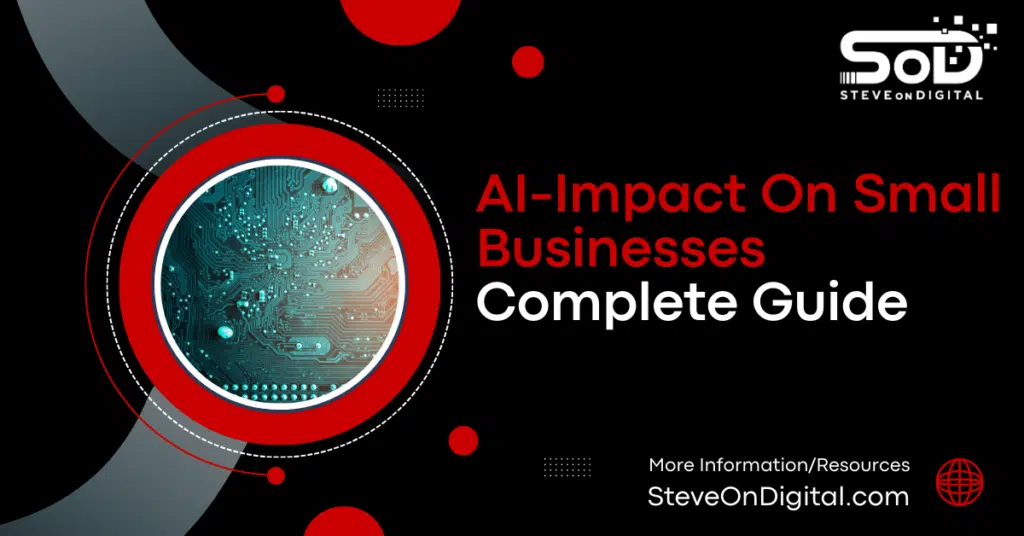AI – Impact On Small Businesses | Complete Guide

Hello, I’m Steve Johnston, the owner and author of SteveOnDigital, and today I want to explore the profound impact of AI on small businesses. As someone deeply entrenched in the digital transformation landscape, particularly for small and medium-sized enterprises (SMEs), I’ve witnessed firsthand how AI is reshaping the way we do business. Impact Of AI On Small Businesses Artificial Intelligence (AI) means machines that act smart like humans to do things and can get better by learning from what they see. AI encompasses a range of tools including machine learning, where computers can be trained to recognize patterns and make decisions based on data. The role of AI in modern business is expansive, influencing everything from data analysis to customer interactions and inventory management, with a variety of AI tools, including AI plug-ins and systems like ChatGPT, offering a spectrum of applications beneficial for small businesses. Overview Of AI Tools And Technologies For small businesses, AI technologies provide a competitive edge by offering valuable insights and automating repetitive tasks. Common AI tools that are particularly beneficial include virtual assistants for handling customer inquiries, chatbots for enhancing the customer experience, and analytical tools that help in recognizing patterns in vast amounts of data quickly. AI Tool Benefits for Small Businesses Virtual Assistants Handles customer inquiries efficiently, reducing wait times. Chatbots Enhances customer service by providing instant responses 24/7. Analytical Tools Quickly identifies patterns in large data sets for better decision-making. AI Plug-ins Integrates with existing software to improve functionality and automation. These tools are not just about technology—they represent a pivot towards more strategic, efficient operational models. The Growing Importance Of AI The adoption of AI by most small businesses has shown notable increases in efficiency and improvements in customer service. AI systems help businesses manage their resources more effectively, ensuring they can focus on growth and innovation. For instance, AI can analyze customer behavior patterns to provide personalized experiences, a crucial factor in building loyalty and satisfaction in today’s market. Implementing AI For Business Operations And Strategic Growth As we delve deeper into the applications of AI, it’s evident that small business owners can leverage this technology to dramatically enhance their operations and position themselves for significant growth. Efficiency And Productivity Enhancement Automation Of Repetitive Tasks Using AI Systems ‘One of the most immediate benefits of AI for small businesses is the automation of mundane, repetitive tasks. AI software can handle activities like scheduling, data entry, and even certain aspects of customer service, freeing up human employees to focus on more complex and creatively demanding tasks. This shift not only improves operational efficiency but also employee satisfaction. AI Application Task Automated Impact on Business Efficiency Automated Scheduling Systems Scheduling and data entry Reduces manual labor and error rates, increasing operational speed. AI Customer Service Platforms Handling routine inquiries Frees up staff for complex tasks, enhancing service quality. AI Financial Tools Generating financial reports Automates analysis, speeding up decision-making processes. AI In Inventory Management AI tools are particularly effective in inventory management, a critical area for many small businesses. AI systems can predict stock needs based on trend analysis, helping businesses maintain optimal stock levels and streamline order processing. This kind of efficiency in operations directly contributes to smoother business processes and reduced overhead costs. Implementing AI For Faster And More Accurate Data Analysis In the realm of data analysis, AI proves invaluable. AI technologies can process vast amounts of data from various sources to derive actionable insights swiftly. This capability allows small business owners to make informed decisions quickly, a decisive advantage in today’s fast-paced market environments. The Strategic Adoption Of AI Technology In the swiftly transforming landscape of modern commerce, artificial intelligence (AI) serves as a cornerstone for enabling small businesses to excel and adapt. By integrating AI tools such as machine learning algorithms and virtual assistants, these enterprises can greatly enhance customer interactions and inventory management, leading to remarkable improvements in operational efficiency. Such technologies are instrumental in allowing small business owners to analyze vast amounts of data quickly, offering valuable insights that drive business growth. AI systems also facilitate enhanced employee training, ensuring that workforce skills align with evolving technological demands. This strategic adoption of AI technology not only secures a competitive edge but also catalyzes sustained economic contributions by small businesses. Business Operation AI Application Expected Outcome Inventory Management Predictive stock needs analysis Optimized stock levels, reduced costs Customer Service Personalized customer interaction Increased customer loyalty and satisfaction Data Analysis Fast processing of large data sets Quick and informed decision-making Marketing Targeted campaigns and content creation Enhanced customer engagement and higher conversion rates Enhancing Customer Interactions And Experience Role Of AI In Managing Customer Inquiries Through Virtual Assistants AI-driven virtual assistants are revolutionizing the way small businesses handle customer inquiries. These AI tools efficiently manage large volumes of inquiries without human intervention, ensuring that customers receive timely and accurate responses. AI Feature Functionality Customer Benefit Personalized Marketing Analyzing customer data for preferences Tailors marketing messages, enhancing user engagement. Proactive Service Bots Predicting customer needs Addresses needs proactively, increasing satisfaction. Real-time Response Systems Handling inquiries instantaneously Improves response times dramatically, ensuring customer needs are met swiftly. My experience with AI in customer service highlights its ability to maintain high standards of customer interaction without significant resource expenditure. Personalizing The Customer Experience With AI-Driven Insights Further, AI’s ability to analyze customer interactions and feedback provides small businesses with the insights needed to tailor services and products to individual preferences. This personalization is crucial for enhancing the customer experience and building stronger relationships with clients. Utilizing AI Tools For Improved Customer Service And Engagement Lastly, AI technology fosters enhanced customer service by predicting customer needs and offering proactive solutions. For instance, AI can suggest additional purchases or remind customers about upcoming events, which enhances engagement and fosters a deeper connection between the business and its customers. AI’s Transformational Impact On Marketing And Sales As a digital transformation specialist, I have utilized AI extensively to refine marketing strategies and

